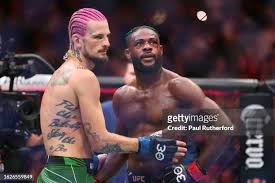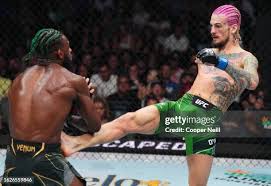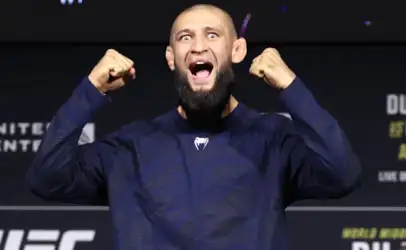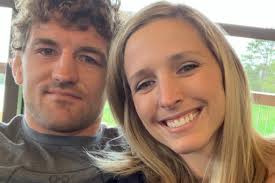
After a two-year reign as Bantamweight champion, Aljamain Sterling lost his title to Sean O’Malley at UFC 292. The fighter initially had no plans of taking the fight as he had just defended his title three months prior against Henry Cejudo. Sterling had not recovered from some of his injuries before accepting the Sean O’Malley fight and getting knocked out in round two.
Aljamain has come to believe he should not have accepted the fight, and looking back at the bout, he has some regrets. The negotiations with UFC executive vice president and chief business officer Hunter Campbell aired in the documentary “Fight Inc: Inside the UFC.” It showed Campbell asking Sterling to take the O’Malley fight.

“I know we’ve seen the video circulating all over social media, [the] conversation between myself, my management [TIKI Ghosn], and Hunter,” Sterling said on his YouTube channel. “I wasn’t really excited to see that clip again because I had to relive all those emotions again. It kind of riled me up a little bit because it really did piss me off in that moment of time. Just kind of how everything unfolded.
“If you look at the series of events, I had just fought. I had a really hard training camp to make that weight cut. I fought one of the greatest combat athletes of all time Henry Cejudo. Five rounds, hard fight, and then the night of the fight–and this is just the series of events. They don’t make fights the night of the fight, but somehow, for whatever reason, my fight in particular just happened to be made that night.”
The two fighters both came into the cage with lingering injuries. It was from a fight for Sterling, but O’Malley’s was from a training accident.
“I had no desire to fight right now.” And that was the whole thing I was saying.” Aljamain explained. “I have to heal up and see how my body holds up. We can fast forward. Yes, I came into the fight compromised, and the training camp compromised. O’Malley got hurt during his training camp, two completely different things, but still the same. Both guys came into the fight with some lingering injuries.

“I think the difference was, in my personal opinion, the mind set. I think O’Malley was there to win at all costs. I was there to win, but I was also just there to be a participant. I hate to say it, but it’s the harsh reality. There’s a complete difference when someone is on, when they’re in the zone, and you can see when someone’s flowing, everything just went perfect. In a basketball game, in a football game, fighting, wrestling, when someone’s just on. You ever see those guys in wrestling tournaments that end up winning the whole thing as an unseeded person because something just clicked? They want to be there, they’re excited, and everything was just in sync for them. I didn’t feel that that night in August. No excuses, once again, no excuses. The better man that night won.”
UFC CEO Dana White had a policy of booking future fights immediately after an event, so it came as a shock to the fighter when he was given the offer of fighting O’Malley within three months of defeating former opponent Henry Cejudo.
“You’re telling me I can sit out, but then you’re also telling me, ‘Well if you don’t fight, then you don’t fight for almost a year,’ and that’s not cool either,” Sterling said. “So you almost tie my hands behind my back, but I take the path where I was like, ‘You know what? If I’m going to roll the dice because my teammates and my managers are all pushing me to do it, I’m going to roll the dice.”




